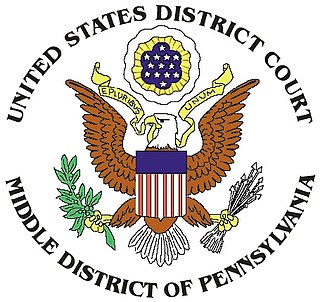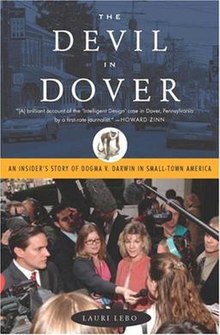Intelligent design (ID) is a pseudoscientific argument for the existence of God, presented by its proponents as "an evidence-based scientific theory about life's origins". Proponents claim that "certain features of the universe and of living things are best explained by an intelligent cause, not an undirected process such as natural selection." ID is a form of creationism that lacks empirical support and offers no testable or tenable hypotheses, and is therefore not science. The leading proponents of ID are associated with the Discovery Institute, a Christian, politically conservative think tank based in the United States.

The National Center for Science Education (NCSE) is a not-for-profit membership organization in the United States whose stated mission is to educate the press and the public on the scientific and educational aspects of controversies surrounding the teaching of evolution and climate change, and to provide information and resources to schools, parents, and other citizens working to keep those topics in public school science education. Based in Oakland, California, it claims 4,500 members that include scientists, teachers, clergy, and citizens of varied religious and political affiliations. The Center opposes the teaching of religious views in science classes in America's public schools; it does this through initiatives such as Project Steve. The Center has been called the United States' "leading anti-creationist organization". The Center is affiliated with the American Association for the Advancement of Science.
Edwards v. Aguillard, 482 U.S. 578 (1987), was a United States Supreme Court case concerning the constitutionality of teaching creationism. The Court considered a Louisiana law requiring that where evolutionary science was taught in public schools, creation science must also be taught. The constitutionality of the law was successfully challenged in District Court, Aguillard v. Treen, 634 F. Supp. 426, and the United States Court of Appeals for the Fifth Circuit affirmed, Aguillard v. Edwards, 765 F.2d 1251. The United States Supreme Court ruled that this law violated the Establishment Clause of the First Amendment because the law was specifically intended to advance a particular religion. In its decision, the court opined that "teaching a variety of scientific theories about the origins of humankind to school children might be validly done with the clear secular intent of enhancing the effectiveness of science instruction."

The history of creationism relates to the history of thought based on the premise that the natural universe had a beginning, and came into being supernaturally. The term creationism in its broad sense covers a wide range of views and interpretations, and was not in common use before the late 19th century. Throughout recorded history, many people have viewed the universe as a created entity. Many ancient historical accounts from around the world refer to or imply a creation of the earth and universe. Although specific historical understandings of creationism have used varying degrees of empirical, spiritual and/or philosophical investigations, they are all based on the view that the universe was created. The Genesis creation narrative has provided a basic framework for Jewish and Christian epistemological understandings of how the universe came into being – through the divine intervention of the god, Yahweh. Historically, literal interpretations of this narrative were more dominant than allegorical ones.
The intelligent design movement is a neo-creationist religious campaign for broad social, academic and political change to promote and support the pseudoscientific idea of intelligent design (ID), which asserts that "certain features of the universe and of living things are best explained by an intelligent cause, not an undirected process such as natural selection." Its chief activities are a campaign to promote public awareness of this concept, the lobbying of policymakers to include its teaching in high school science classes, and legal action, either to defend such teaching or to remove barriers otherwise preventing it. The movement arose out of the creation science movement in the United States, and is driven by a small group of proponents.

The Wedge Strategy is a creationist political and social action plan authored by the Discovery Institute, the hub of the pseudoscientific intelligent design movement. The strategy was put forth in a Discovery Institute manifesto known as the Wedge Document. Its goal is to change American culture by shaping public policy to reflect politically conservative fundamentalist evangelical Protestant values. The wedge metaphor is attributed to Phillip E. Johnson and depicts a metal wedge splitting a log.

Of Pandas and People: The Central Question of Biological Origins is a controversial 1989 school-level supplementary textbook written by Percival Davis and Dean H. Kenyon, edited by Charles Thaxton and published by the Texas-based Foundation for Thought and Ethics (FTE). The textbook endorses the pseudoscientific concept of intelligent design – the argument that life shows evidence of being designed by an intelligent agent which is not named specifically in the book, although proponents understand that it refers to the Christian God. The overview chapter was written by young Earth creationist Nancy Pearcey. They present various polemical arguments against the scientific theory of evolution. Before publication, early drafts used cognates of "creationist". After the Edwards v. Aguillard Supreme Court ruling that creationism is religion and not science, these were changed to refer to "intelligent design". The second edition published in 1993 included a contribution written by Michael Behe.
The "teach the controversy" campaign of the Discovery Institute seeks to promote the pseudoscientific principle of intelligent design as part of its attempts to discredit the teaching of evolution in United States public high school science courses. Scientific organizations point out that the institute claims that there is a scientific controversy where in fact none exists.
An intelligent designer, also referred to as an intelligent agent, is the pseudoscientific hypothetical willed and self-aware entity that the intelligent design movement argues had some role in the origin and/or development of life. The term "intelligent cause" is also used, implying their teleological supposition of direction and purpose in features of the universe and of living things.
Robert T. Pennock is a philosopher working on the Avida digital organism project at Michigan State University where he has been full professor since 2000. Pennock was a witness in the Kitzmiller v. Dover Area School District trial, testifying on behalf of the plaintiffs, and described how intelligent design is an updated form of creationism and not science, pointing out that the arguments were essentially the same as traditional creationist arguments with adjustments to the message to eliminate explicit mention of God and the Bible as well as adopting a postmodern deconstructionist language. Pennock also laid out the philosophical history of methodological and philosophical naturalism as they underpin to science, and explained that if intelligent design were truly embraced it would return Western civilization to a pre-Enlightenment state.

Kitzmiller v. Dover Area School District, 400 F. Supp. 2d 707 was the first direct challenge brought in the United States federal courts testing a public school district policy that required the teaching of intelligent design (ID), ultimately found by the court to not be science. In October 2004, the Dover Area School District of York County, Pennsylvania, changed its biology teaching curriculum to require that intelligent design be presented as an alternative to evolution theory, and that Of Pandas and People, a textbook advocating intelligent design, was to be used as a reference book. The prominence of this textbook during the trial was such that the case is sometimes referred to as the Dover Panda Trial, a name which recalls the popular name of the Scopes Monkey Trial in Tennessee, 80 years earlier. The plaintiffs successfully argued that intelligent design is a form of creationism, and that the school board policy violated the Establishment Clause of the First Amendment to the United States Constitution. The judge's decision sparked considerable response from both supporters and critics.

Neo-creationism is a pseudoscientific movement which aims to restate creationism in terms more likely to be well received by the public, by policy makers, by educators and by the scientific community. It aims to re-frame the debate over the origins of life in non-religious terms and without appeals to scripture. This comes in response to the 1987 ruling by the United States Supreme Court in Edwards v. Aguillard that creationism is an inherently religious concept and that advocating it as correct or accurate in public-school curricula violates the Establishment Clause of the First Amendment.
The intelligent design movement has conducted an organized campaign largely in the United States that promotes a pseudoscientific, neo-creationist religious agenda calling for broad social, academic and political changes centering on intelligent design.

Uncommon Dissent: Intellectuals Who Find Darwinism Unconvincing is a 2004 anthology edited by William A. Dembski in which fifteen intellectuals, eight of whom are leading intelligent design proponents associated with the Discovery Institute's Center for Science and Culture (CSC) and the International Society for Complexity, Information and Design (ISCID), criticise "Darwinism" and make a case for intelligent design. It is published by the publishing wing of the paleoconservative Intercollegiate Studies Institute. The foreword is by John Wilson, editor of the evangelical Christian magazine Christianity Today. The title is a pun on the principle of biology known as common descent. The Discovery Institute is the engine behind the intelligent design movement.

Rejection of evolution by religious groups, sometimes called creation–evolution controversy, has a long history. In response to theories developed by scientists, some religious individuals and organizations question the legitimacy of scientific ideas that contradicted the young earth pseudoscientific interpretation of the creation account in Genesis.
The Discovery Institute has conducted a series of related public relations campaigns which seek to promote intelligent design while attempting to discredit evolutionary biology, which the Institute terms "Darwinism". The Discovery Institute promotes the pseudoscientific intelligent design movement and is represented by Creative Response Concepts, a public relations firm.

This timeline of intelligent design outlines the major events in the development of intelligent design as presented and promoted by the intelligent design movement.
Christina Castillo Comer is the former Director of Science in the curriculum division of the Texas Education Agency (TEA). Comer spent nine years as the Director of Science until she resigned on November 7, 2007. Comer's resignation has sparked controversy about agency politics and the debate to teach evolution in public schools versus creationism or intelligent design.
Lauri Lebo is a spokeswoman for the Pennsylvania State Education Association, Secretary of the ACLU-Pennsylvania Board of Directors, author, former radio station co-owner and disc jockey, and reporter from York County, Pennsylvania. Lebo was the principal local reporter covering Kitzmiller v. Dover in 2004 and 2005, and was featured prominently in the Nova documentary Judgment Day: Intelligent Design on Trial both because of her coverage and because her father, Shiremanstown Mayor Dean Lebo, who co-owned Christian radio station WWII-AM, sided with the Dover school board in the controversy.
In American schools, the Genesis creation narrative was generally taught as the origin of the universe and of life until Darwin's scientific theories became widely accepted. While there was some immediate backlash, organized opposition did not get underway until the Fundamentalist–Modernist controversy broke out following World War I; several states passed laws banning the teaching of evolution while others debated them but did not pass them. The Scopes Trial was the result of a challenge to the law in Tennessee. Scopes lost his case, and further U.S. states passed laws banning the teaching of evolution.






